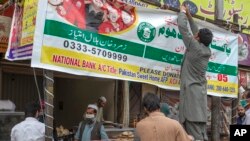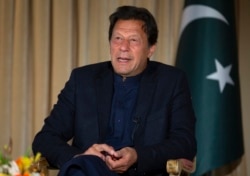Global advocates for media freedom said Tuesday that while “total impunity” for violent crimes against journalists has persisted in Pakistan, workers at the country’s leading independent newspapers and television channels continue to work without pay or with major salary cuts associated with the COVID-19 outbreak.
Pakistan ranks 145 out of 180 countries, according to an annual press freedom index issued Tuesday by Reporters Without Borders. The South Asian nation was listed 142 in the 2019 ranking.
The Paris-based advocacy group, often referred to by its French acronym RSF, blamed the powerful military institution for undermining the independence of journalism in Pakistan, allegations other critics also have repeatedly leveled in recent years.
“There have been many cases of brazen censorship in which the military have used a number of methods for exercising pressure,” the group’s report said.
RSF also accused Prime Minister Imran Khan’s government of trying “to step up online regulation” to encourage media censorship.
Pakistani officials did not immediately comment on the report. Both the government and the military, however, have consistently denied allegations they want to curtail mainstream or social media freedoms in the country.
Journalists unpaid
Separately, the International Federation of Journalists (IFJ) said Tuesday that employees at Pakistan’s largest group of independent newspapers and TV stations, Jang Media, have not been paid for more than four months.
Pakistani journalists and activists have welcomed the IFJ statement, saying it highlights an issue that plagues almost the entire industry in the country where a majority of media workers have long complained of delayed payment or nonpayment of their salaries for months.
"Media workers in Pakistan are currently facing some of the worst of the economic pressures associated with COVID-19 after struggling with years of systematic wage theft,” lamented an IFJ statement.
The Brussels-based global voice for journalists demanded the administration of Jang Media Group immediately pay the outstanding salaries and reinstate all employees it recently terminated.
There was no immediate reaction from the Jang Media Group to the allegations.
Last month, Pakistani anti-corruption authorities arrested the company’s owner and editor-in-chief, Mir Shakil-ur-Rahman, for illegally obtaining government land more than 30 years ago.
Rahman’s group and attorneys have rejected accusations of wrongdoing in the real estate purchase deal, denouncing the arrest as an “attack on the freedom of expression.”
Shakeel Qarar, the president of the national press club in Islamabad, says newspaper owners and television channels in some cases have not paid their employees for at least 10 months.
“Those who have protested … nonpayments have even been laid off without clearing their outstanding dues,” Qarar told VOA.
“This has forced a large number of journalists to look for other streams of income such as video blogging on social media while others are driving cabs or have opened shops to feed their families,” he said.
Journalists working in mainstream media say that since the outbreak of the coronavirus in Pakistan, their owners have told them to work from home for safety reasons on the one hand and have cut salaries as well as travel allowances citing a lack of outdoor activity on the other.
Most media groups had made the last bulk payments of outstanding salaries to their employees in June 2018 when they were ordered to do so by Pakistan’s Supreme Court.
Media owners argue that one of the main reasons they are unable to pay or ensure timely payment of salaries to their employees is nonpayment of government advertisement charges that has strained their financial resources.
Pakistani officials and independent observers question the argument, saying owners of major media companies have for decades benefited from the public advertisement system, but they have not passed on the benefit to their workers.





